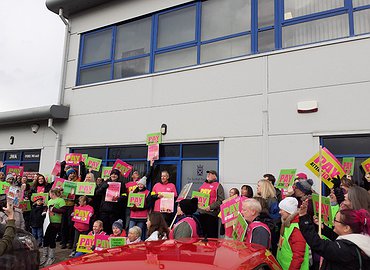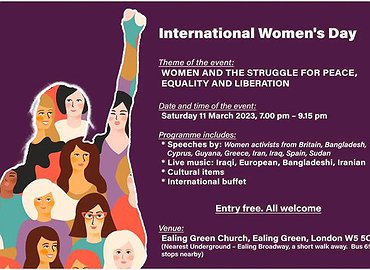El pasado sábado 11 de marzo, camaradas del núcleo de Gran Bretaña participaron en el acto del día internacional de la mujer trabajadora organizado por el CCCPiB (Co-ordinating Committee of Communist Parties in Britain). En este evento celebrado en Londres, una de nuesstra camaradas fue la encargada de leer el discurso presentado por nuestro núcleo. El cual podéis leer en su versión integra en inglés en el presente artículo.
Ante una sala llena de camaradas de distintas nacionalidades representando la lucha feminista, se pronunciaron discursos por parte de las representantes de los distintos partidos comunistas que conforman la coordiandora de la que formamos parte. También hubo actuaciones musicales, una interpretación al piano de piezas clásicas de la música iraní y otra compuesta de piezas de Iraq tocadas con ud. Para finalizar este día tan importante, se compartió una cena con comida típica de cada uno de los países representados.
Cartel del evento organizado por el CCCPiB.
Discurso pronunciado por la camarada del PCE GB:
Women and the Struggle for Peace, Equality, and Liberation- CCCPiB
I would like to start by expressing our gratitude to the organization CCCPiB for giving us this opportunity to participate in their event and vindicate our struggle as working women within the feminist movement. It is a pleasure to be here surrounded by other comrades in our fight for women’s emancipation. Us Women, as part of the system’s workforce, at home raising families and as indispensable figures in society, we must be taken into account. And that is what we are here for.
As socialists, we think it is important to highlight the origin of the celebration of this International Working Women's Day, which was first named as such by the Marxist theorist and activist Clara Zetkin. In 1910, Clara Zetkin proposed that an annual women’s day be held to raise awareness of total social and human liberation and equality for all womankind.
As years passed by, and the specter of Communism expanded through Europe, what in the beginning was regarded as revolutionary ideas such as universal suffrage, seeking employment outside the domestic sphere, women's freedom of organization and reunion or our mere involvement in politics, could finally become a reality during the Spanish Republic starting in 1931. We can't help but mention the role of Dolores Ibárruri, commonly known as La Pasionaria, in these events. La Pasionaria, as a revolutionary leader, found in Communism the prospect of a world free of class distinction ruled by the proletariat with genuine and effective women emancipation. She worked with multiple organizations, including the Communist Party of Spain (PCE, which I am here to represent), and several anti-Fascist women’s groups.
However, the fact of achieving some rights does not mean that they cannot be taken from us again — as happened during the 40 years of fascism in Spain, on account of Franco's dictatorship commencing in 1939. Women were considered inferior and unworthy of equal treatment by an oppressing system ruled by the dominant class. Our mothers and grandmothers were enforced by the regime through laws that regulated women’s labour outside the home, so that they could not take part in paid labour with fair wages. They became submissive members of society dependent on a social system that prevented them from most types of basic human rights, such as receiving an education or apprenticeship, freedom of association, or divorcing their husbands through the imposition of the traditional Catholic family.
This example shows us the great importance of never taking for granted our achievements. We shall never let our guard down for what's worth fighting for!
Nowadays, after almost 50 years of a restored Spanish democracy deeply rooted in neoliberalism, working class women have been able to engage again in the fight for emancipation from a society that oppresses them for both their gender and class. Nonetheless, the capitalist system has commodified the feminist liberation struggle, transforming it into another marketing ploy by removing any revolutionary backdrop of it and, by means of that, sweeping exploitation of proletarian women by capitalism and patriarchy under the carpet.
Surrogacy is an example of how the capitalist and patriarchal systems feedback to find new ways to continue oppressing and exploiting women’s bodies by putting the wishes of a minority ahead and turning them into a right at the expense of the health and needs of working-class women. The dominant class is taking advantage of their material circumstances and promoting it as an altruistic act. This is the extent to how individualistic ideology embeds in our society. (Comrades, we shall not forget!): Having a family is not a right, surrogacy is another form of violence against women.
As working women, we must protect ourselves from the continuous attacks against our rights and be alert to these attempts to dismantle organized women, with deeply individualistic messages and neoliberal ideology camouflaged as progressive and empowering, such as the pro-sex movement, which can be misleading and appealing especially for younger women leading them to subject their bodies to violence thinking they are choosing freely and seen this as an alternative to the precarious working conditions or unemployment. As a matter of fact, while this fake gender equality propaganda continues spreading, the working class in general, —and female workers in particular— are increasingly mired in a cycle of scarcity and precariousness. If we avoid mainstream media and search out information on independent presses, then we can uncover the serious situation that Spanish women are living in. Let me name just a few:
-
In Spain, more than 4 million women in working age are at risk or live below the poverty line. Women hold most of the country's part-time jobs, and many of them work in low-wage temporary positions, apart from suffering from anxiety disorders, and face other stress-related health conditions due to the imposed conciliation between work and family (As stated in PRNoticias, October 2022).
-
At the moment, and as a result of what's been previously mentioned, women are on strike in the education, textile, cleaning and home caring industries, in some cases just to meet the minimum wage (According to elDiario.es, published in January and November 2022).
As for gender-based and sexual violence, latest data shows us a very bleak picture:
-
Sexual offenses increased by more than 34,6% in a year ́s time. (According to El País, August 2022).
-
The report released by forty women’s organizations shows flaws in the system of protecting victims of gender-based violence. (As published in ABC, January 2023).
-
In Onlyfans and Patreon, among other platforms, the act of displaying your naked body to men is presented as a form of female empowerment. Unfortunately, this new form of sexual exploitation has been significantly increasing in the past few years among lower-class women. (According to La República, December 2021).
Given the awareness of more women about their subjugation in recent years, this has resulted in massive responses in the streets, especially around the increasing gender violence. The backlash to suppress the feminist movement demonstrates that misogyny is also organized and takes advantage of the inherent gaps within a movement made up of women who have very different ideas of what oppresses them, why and how to liberate themselves. We, as working-class women and as communists, know that our liberation cannot and will not take place in a capitalist society, and our struggle is conditioned by our belonging to the oppressed class. Our double oppression, triple in the case of our racialized comrades, shows us the path to follow towards our complete liberation, which involves the destruction of the capitalist and patriarchal systems and the construction of a just and egalitarian socialist society formed by emancipated women and men.
I did not want to finish before first calling to mind why this date is so important for us. As working class women and communists, it falls within our power, by means of organization and class consciousness spread, to bring back the 8th of March to its former meaning. A day to raise awareness but most importantly a day of struggle.
Nuestra camarada del núcleo pronunciando el discurso por el día internacional de la mujer trabajadora.




